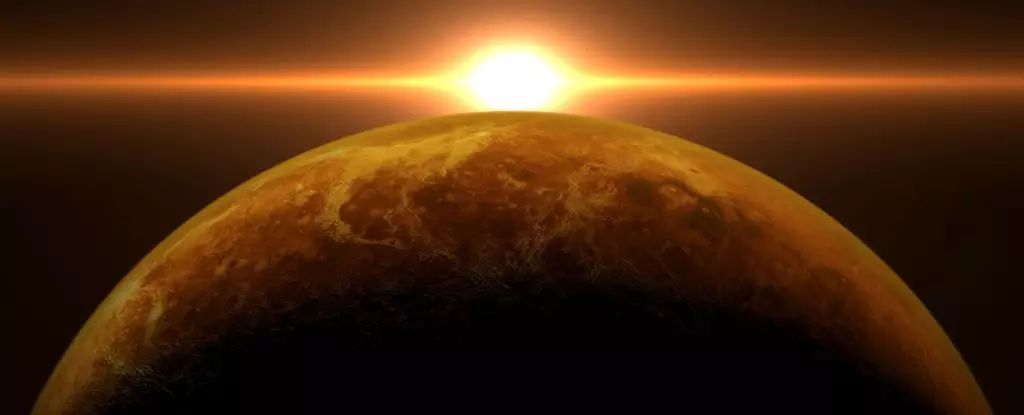Venus has always intrigued scientists and casual observers alike as Earth’s enigmatic twin. For decades, the prevailing narrative painted Venus as a cautionary tale of what could happen to Earth should we fail to curb our environmental transgressions. The glowing disc in the night sky, once thought to have been a verdant paradise with vast oceans, has transformed into an archetype of planetary calamity. However, new research challenges this preconceived notion, suggesting that Venus may have never possessed liquid water or conditions conducive to life. This transformative analysis prompts a reevaluation of the planet as merely a barren wasteland, paving the way for exciting new questions about habitability throughout the universe.
Led by Tereza Constantinou from the University of Cambridge, the latest investigation into Venus’s atmosphere provides significant insights into its water history. Researchers focused on the dynamics of water, carbon dioxide, and carbonyl sulfide in Venus’s atmosphere, particularly noting their stability over time. By assessing the rate at which these gases decompose, the team emphasizes how essential volcanic activity is for maintaining atmospheric cohesion and balance. In stark contrast to Earth, where volcanic gases are predominantly steam, the findings reveal that only about 6% of Venus’s volcanic outgassing consists of steam. This thin veil of moisture suggests that the planet has always possessed a fundamentally dry interior.
This aridity is critical to understanding Venus’s environment. If the planet never had enough water to form oceans, then all hypotheses suggesting a once-friendly habitat for life must be revisited. The implications are profound: Venus’s surface features, relatively untouched by water erosion, align with this conclusion, unlike those found on Earth or even Mars—two planets that exhibit significant evidence of past aqueous environments.
The age-old question—was Venus ever habitable?—arises prominently in light of Constantinou’s research. If Venus was never capable of supporting liquid water, then many assumptions about its potential for life fall apart, which also brings into question the habitability of similar exoplanets. Based on Earth’s evolutionary trajectory and current environmental challenges, researchers have suggested that analyzing Venus’s history provides clues about the future of our own planet. Could it be that we are not just on a fragile timeline but rather on a course potentially resembling that of Venus? This concern adds urgency to endeavors aimed at mitigating climate change on Earth.
The revelation that Venus has likely never hosted liquid oceans paints a sobering picture of the planet as a natural laboratory for habitability considerations. It allows scientists to theorize about the biological adaptations life might need to endure in oppressive conditions, different from any currently known life forms. The idea that Venus might not have undergone a transformation from “Earth Gone Bad” to inhospitable waste emphasizes its uniqueness and the need for careful consideration in future planetary studies.
This new understanding of Venus as a dry and inhospitable planet marks a turning point not only in planetary science but also in astrobiology. If other terrestrial planets showcase conditions similar to what Venus presents today, they may also hold fewer opportunities for life. For missions contemplating searching for life beyond our solar system, these findings stress the importance of a nuanced approach. Habitable exoplanets must be evaluated through multiple lenses, including their atmospheres’ chemical compositions, geological activity, and thermal profiles, rather than purely for their size and distance from their stars.
The profound realization that Venus may never have boasted vast oceans serves as both a warning and a reminder. The quest to understand our universe involves not merely searching for signs of life but also for the conditions conducive to life. Venus, once looked to as a mirror reflecting Earth’s potential demise, ultimately provides a gateway for exploration into the potential diversity of life-hosting conditions across the cosmos.
While Venus dazzles with its brilliance and proximity, the reality of its environment—the absence of liquid water and hostile conditions—forces a reevaluation of our understanding of planetary habitability. As we strive to comprehend not just the planetary systems of our solar neighborhood but also those far beyond, Venus stands as a testament to the shifting narratives of scientific discoveries. The focus on its arid nature reshapes expectations for what constitutes a habitable world, pushing scientific boundaries and channels for exploration both on Earth and in the vast universe. Should we discover life in Venus’s clouds, it will likely be entirely unrecognizable to us, capturing our imagination in ways we have not yet begun to conceive.


Leave a Reply